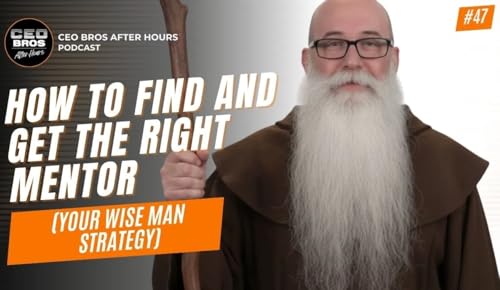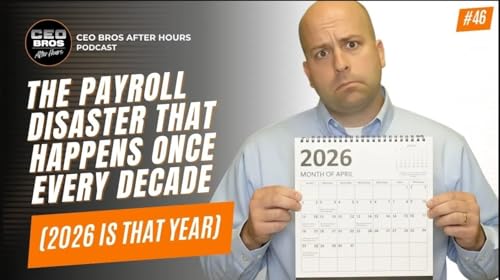Brad asks for exactly 15 minutes. At 14 minutes and 59 seconds, he stands up and leaves. Doesn't matter if they're interested or want him to stay. He asked for 15 minutes, that's what he takes. Most salespeople overstay. Brad walks out while they're still engaged. Next meeting, they already know he respects time. No bracing for a pitch that won't end. This is episode 50. How to actually close deals instead of just talking about closing.
*YOU'LL DISCOVER*
• Brad's 15-minute rule: leaving on the number gets more second meetings
• VHT Studios closed 10,000 units in Jacksonville, Orlando said "we weren't involved" •
Why dropping price proves you never conveyed value
• Where deals die after you think they're closed
*WHAT ACTUALLY WORKS*
• Ask for short time, leave exactly when promised
• Ask who signs the contract upfront
• Never drop price first (shows you don't believe in value)
• Stay urgent after verbal yes (time kills unsigned deals)
*WHO THESE GUYS ARE* Brian Balduf co-founded and sold VHT Studios. Brad Balduf runs By Your Side Autism Therapy with 550 employees across 11 centers. Matt Croke keeps it honest and pulls out the chaos. They've been there, survived it, and have the scars to prove it.
*THE UNCOMFORTABLE TRUTH* "If you resort to price reduction early, you're showing your cards. You've left yourself nowhere to go. You didn't convey value. The deal was already lost." Ever close a deal only to watch it die in legal? Drop your approach in the comments.
👇 SUBSCRIBE for new episodes every Friday. Real stories, real disasters, no LinkedIn energy. ————————————
*TIMESTAMPS*
0:43 - Every employee should take money from customers
4:05 - The three things that make closing work
10:30 - What are all the things that can go wrong?
13:00 - Dropping price is the rookie death spiral
16:02 - The Regional VP disaster (lost half the deal)
20:03 - Orlando region wasn't participating
26:40 - Brad's 15-minute rule (leave on the number)
29:11 - Time kills all deals (urgency after verbal yes)
*ABOUT CEO BROS AFTER HOURS* CEO BROS: After Hours is raw business talk from CEO brothers Brian Balduf (VHT Studios) and Brad Balduf (By Your Side Autism Therapy) with host Matt Croke. Every Friday they share what actually happens building companies: brutal failures, scaling disasters, and the messy truth about leadership. No corporate polish. No LinkedIn energy. Just honest stories from the trenches.
🍸 *WIND DOWN WITH THE BROS: THIS WEEK'S COCKTAILS* Three drinks for three closing strategies. Pick your move.
🍸 *THE 15-MINUTE TIMER* Brad Balduf - Leaves at 14:59 every time Recipe: • 2 oz tequila blanco • ¾ oz lime juice • ½ oz agave syrup • 2 dashes orange bitters • Lime wheel • Shake with ice, strain into coupe The Vibe: Brad asks for 15 minutes and leaves on the number. No lingering, no pushing, no overstaying. This drink is clean, crisp, respectful. You asked for a cocktail, here it is, exactly as promised.
🍸 *THE REGIONAL VP* Brian Balduf - Sold 10,000 units to the wrong guy Recipe: • 2 oz dark rum • 1 oz pineapple juice • ½ oz lime juice • ¼ oz Campari • Pineapple wedge • Shake with ice, strain over fresh ice The Vibe: Looks complete, tastes good, then bitterness hits. VHT Studios negotiated for months with Jacksonville. Orlando said "we weren't involved." Only got half. This drink promises more than it delivers.
🍸 *THE RED LINE* Matt Croke - For deals that die in legal review Recipe: • 2 oz Irish whiskey • ¾ oz sweet vermouth • ½ oz Cynar • 2 dashes Angostura bitters • Orange peel • Stir with ice, strain into rocks glass The Vibe: Smooth at first, then unexpected complexity. Deal's done, attorneys redline one thing, business people get involved, three weeks later there's a "major problem." This drink's got layers you didn't see coming. Make all three. Figure out your closing style. Respect time and leave early? Talk to the wrong person for months? Or think it's done before it's signed? Tag us.
*JOIN THE CONVERSATION* https://x.com/CeoBrosAH https://www.instagram.com/ceobrosah/ https://www.facebook.com/CEOBrosAH https://www.linkedin.com/company/ceo-bros
#entrepreneurship #sales #closingdeals #businessstrategy #startuplife
Music: "Back to Black" by Rockin' For Decades (licensed through Epidemic Sound)
 27 mins
27 mins Jan 23 202628 mins
Jan 23 202628 mins Jan 16 202633 mins
Jan 16 202633 mins 32 mins
32 mins Jan 2 20268 mins
Jan 2 20268 mins Dec 26 202529 mins
Dec 26 202529 mins Dec 12 202528 mins
Dec 12 202528 mins

